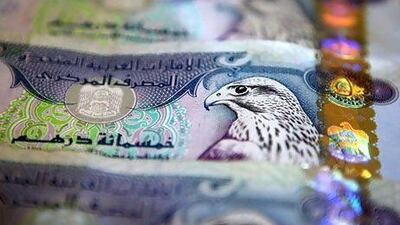The UAE reached a fiscal surplus last year for the first time in three years, despite a bigger than expected spending increase in Abu Dhabi.
Surpluses reached Dh38.6 billion (US$10.5bn), or 2.9 per cent of GDP within the consolidated budget, which includes spending and revenues for all the emirates and the federal Government, according to an IMF report.
Higher oil prices and increased production helped revenues to rise 41 per cent to Dh440bn.
This represented a turnaround from deficits during the two previous years, as the global financial crisis sank oil prices and prompted a property crash in Dubai.
Last year's balanced budget came about even though the Abu Dhabi Government increased spending by 21 per cent last year to Dh315bn. The emirate's budget accounts for more than two thirds of total consolidated spending. Its revenue rose by 46 per cent to Dh281bn, with a large part of that due to higher oil revenues.
"Abu Dhabi's spending was higher than expected last year," said Giyas Gokkent, the chief economist at National Bank of Abu Dhabi. "The signs were that it would [be] kept at a similar level to last year but one-off trends have come to the agenda."
Loans and equities extended by Abu Dhabi rose 39 per cent to Dh88bn during the year. Lending to housing and building projects may be behind the increase, said Mr Gokkent.
Another big driver was spending on federal services, which are mainly outlays on defence and security. Spending in the area rose from Dh72.7bn the previous year to Dh80.3bn last year, the data showed.
Transfers from the capital to Dubai dropped to Dh9.9bn last year from Dh11bn the previous year. Abu Dhabi agreed to contribute to a $20bn assistance for Dubai in 2009 after the emirate warned it might not meet its debt obligations.
Subsidies and transfers by Abu Dhabi rose to Dh33.6bn from Dh25.6bn in 2010. Meanwhile, water and electricity support edged up to Dh12.4bn from Dh10.8bn.
"Other" grants and transfers more than doubled to Dh13.3bn. Support to the Northern Emirates dropped slightly to Dh1.6bn. Food subsidies rose to Dh409 million last year, from Dh40m the year before.
This follows the Government's move last year to increase its spending on welfare support in an effort to improve the living standards of nationals. Such spending included more than $2bn in housing loans for Emiratis.
The increase was in line with a rise of more than a third to Dh53.8bn in subsidies and transfers in the consolidated budget.
"Economists tend not to prefer subsidies as they can distort the market but you can make a case for it if it's targeted and can be good to redistribute wealth," said Khatija Haque, a senior GCC economist at Emirates NBD.

